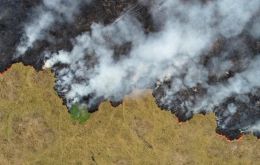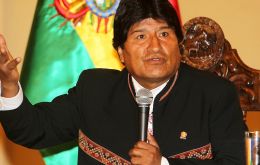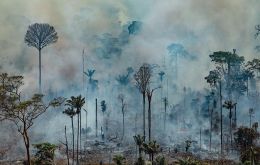MercoPress. South Atlantic News Agency
Environment
-
Tuesday, August 27th 2019 - 09:57 UTC
Brazil rejects G7 aid, and tells Macron to reforest Europe and to look after world heritage sites

Brazil rejected aid from G7 countries to fight wildfires in the Amazon, with a top official telling French President Emmanuel Macron to take care of “his home and his colonies.”
-
Tuesday, August 27th 2019 - 09:44 UTC
G7 summit pledges US$ 20 million for firefighting planes to tackle Amazon blazes

The G7 will give US$20 million (€18 million) to send firefighting planes to tackle the blazes engulfing parts of the Amazon, the presidents of France and Chile said on Monday.
-
Tuesday, August 27th 2019 - 09:44 UTC
Hundreds of new fires in the Brazilian Amazon, despite military aircraft dumping water

Hundreds of new fires have flared up in the Amazon in Brazil, data showed on Monday, even as military aircraft dumped water over hard-hit areas and G7 nations pledged to help combat the blazes.
-
Tuesday, August 27th 2019 - 07:38 UTC
PM Johnson pledges £10 million to restore Amazon rainforest; UK wants to host 2020 climate change conference

British Prime Minister Boris Johnson on Monday pledged £10 million (US$12.3 million) to help restore the Amazon rainforest that has been ravaged by fires, sparking a wave of global concern. The money would be made available immediately to help restore the habitat, including areas that have been hit by the fires, the British government said in a statement released at the G7 summit in the French resort of Biarritz.
-
Monday, August 26th 2019 - 20:13 UTC
Record number of fires in the Amazon rainforest coincides with a sharp drop in fines for environment violations

The record number of fires in Brazil's Amazon rainforest has coincided with a sharp drop in fines for environmental violations, BBC analysis has found. Official data from Brazil's environment agency shows fines from January to 23 August dropped almost a third compared with the same period last year.
-
Monday, August 26th 2019 - 19:13 UTC
Brazilian warplanes dumpling water on the Amazon forest, but will it be enough?

Brazilian warplanes are dumping water on the burning forest in the Amazon state of Rondonia, responding to a global outcry over the destruction of the world's largest tropical rainforest, according to a government video.
-
Monday, August 26th 2019 - 18:42 UTC
EU divided on ratification of trade pact with Mercosur, warns Donald Tusk

The European Union Council president Donald Tusk said it was hard to imagine the bloc ratifying its trade pact with Mercosur as long as Brazil fails to curb the fires ravaging the Amazon rainforest. The EU “stands by the EU-Mercosur agreement”, Tusk told reporters at a G7 meeting in Biarritz in southern France.
-
Monday, August 26th 2019 - 18:18 UTC
Morales suspends re-election campaigning and calls for aid to fight blazes in the Bolivian Amazon

Bolivian President Evo Morales said on Sunday he is open to international aid to fight the blazes that have engulfed rural villages and doubled in size since Thursday. Morales is also suspending his campaign for re-election for at least a week, just two months from election day, to focus on the wildfires.
-
Monday, August 26th 2019 - 17:56 UTC
New fires raging in the Amazon; agriculture sector warns Bolsonaro: “nationalistic bravado will not win the game”

Hundreds of new fires are raging in the Amazon rainforest in Brazil, official data showed, as thousands of troops were made available to help fight the worst blazes in years following a global outcry. Multiple fires billowing huge plumes of smoke into the air were seen across a vast area of the northwestern state of Rondonia.
-
Monday, August 26th 2019 - 17:48 UTC
Pope Francis calls for the protection of “the lung of forests vital for our planet”

Pope Francis on Sunday called for a global commitment to put out the fires in the Amazon, saying the area was essential for the health of the planet. “We are all worried about the vast fires that have developed in the Amazon. Let us pray so that, with the commitment of all, they can be put out soon.”
